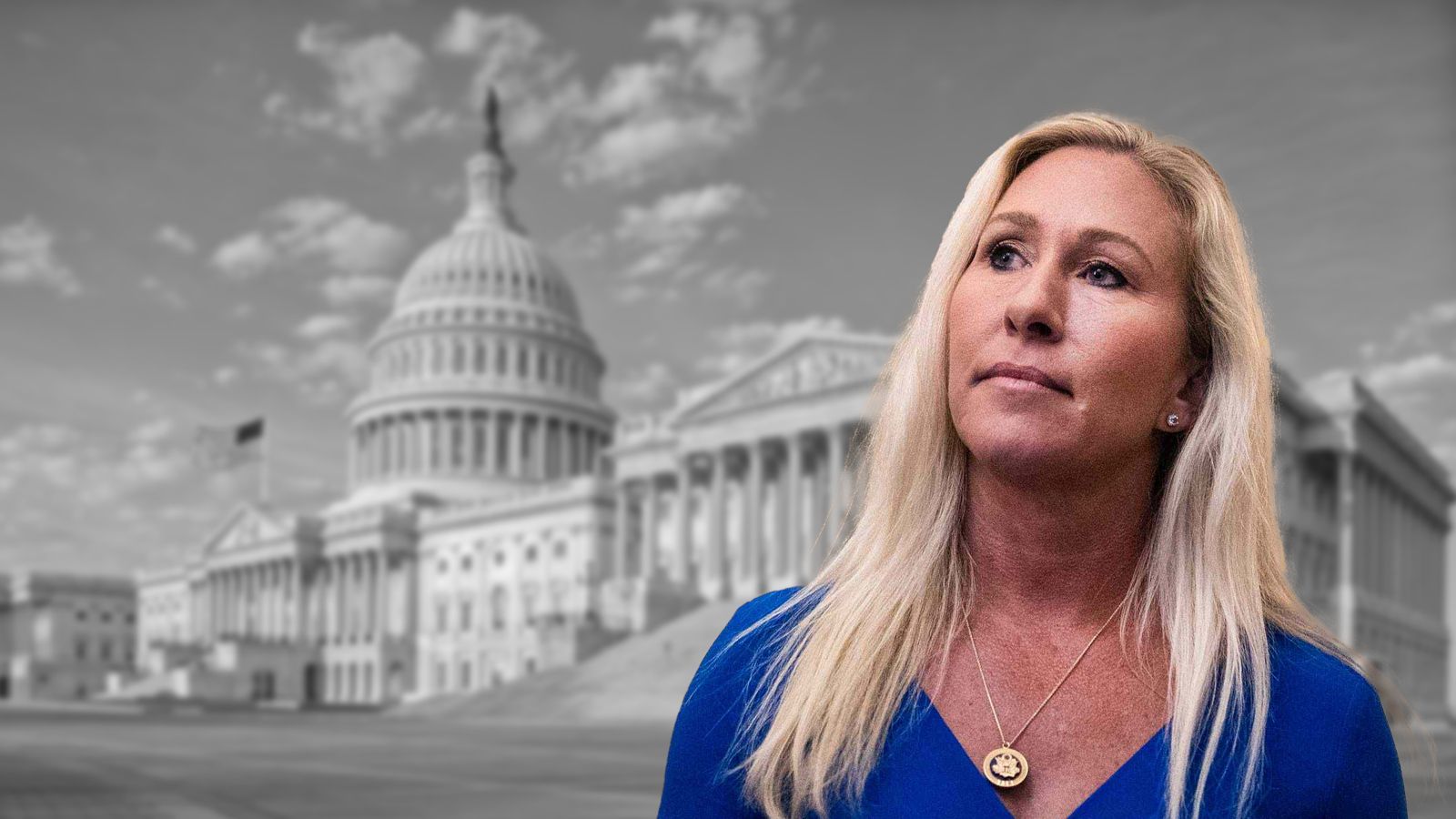
Did someone forward you this? Subscribe here free!
This week, we’re offering our Black Friday sale: 50% off the all-access Roca Platinum membership. Support our mission and become a member here!
Good morning, Roca Nation. Here are today’s four need-to-know stories:
Trump and Mamdani met at the White House on Friday (free)
Representative Marjorie Taylor Greene announced she would resign from Congress
US and Ukrainian officials met in Geneva to discuss a peace plan
Trump said he terminated temporary deportation protections for Somali immigrants (free)
By Rob McGreevy and Max Frost
In 2020, journalists honed in on a newly elected House representative from Georgia, Marjorie Taylor Greene.
Greene had been writing for fringe conservative news websites and working as a CrossFit trainer prior to her victory, and her social media history quickly became a well of content for political writers. They began devoting one story after another to highlighting her most outlandish positions.
Among them was a Facebook post after the 2017 Las Vegas shooting:
How do you get avid gun owners and people that support the Second Amendment to give up their guns and go along with anti-gun legislation? You make them scared, you make them victims and you change their mindset... Is that what happened in Las Vegas?
In 2018, she endorsed the theory that Florida’s Parkland shooting – which killed 17 people – was a “false flag planned shooting,” claiming that the local sheriff was “paid to…keep his mouth shut.”
And later that same year, she wrote of the devastating California Camp Fire that “there are too many coincidences to ignore.” The Rothschilds, she wrote, had played a role in “lasers or blue beams of light causing the fire.”
Conspiratorial posts like these led to a campaign to discredit Greene or force her resignation. For a time, they seemed likely to work. But Greene stuck to her guns, remained loyal to Trump, and toughed it out. While many knew her as the “Jewish space lasers” lady (a phrase she never actually used), she had won her first major battle and now had a loyal base behind her.
That was all in 2020-21. By this summer, Greene had become one of the country’s most influential Republicans, appearing on the country’s biggest talk shows and being floated as a potential 2028 presidential candidate. Then, on Friday, she unexpectedly resigned.
So how did Greene rise? Why did she resign? What will she do next?
In today’s deep-dive, we look at those questions to see what may be next for one of DC’s most unusual politicians.
This full report is for Roca Members, who fund our journalism. This week is our Black Friday sale: The complete Roca platinum membership for 50% off! Take advantage of the offer here. After subscribing, you can access all of our articles here!

Get All-Access Roca for 50% Off!
This week is the first-ever Roca Black Friday sale!
Are you tired of seeing paywalled articles? Do you wish you could read all the deep-dives that hit your inbox, but don’t want to shell out the cash for a membership? Do you want to support your favorite non-partisan news outlet?
Set your worries aside, because this week you can get all-access Roca for 50% off!
Become a Roca Platinum member and you’ll get access to all of Roca: WeThe66, the RocaNews App, and our extended need-to-know stories. You can do that this week for half price – and guarantee yourself accurate news at a low price for the next year
Lock in a year’s worth of non-partisan news for 50% off today, at the Roca Black Friday sale
Editor’s Note
What are your thoughts on MTG? Could she stage a 2028 run? Why do you think she’s resigning? Let us know by replying to this email. We’re very curious to hear what you think about this.
Both our Saturday and Sunday deep-dives were very well received. If you missed them, find them below:
Many of you wrote in with takes on yesterday’s, about why young people are returning to church. Some of you also wrote in to voice your concerns about that, or express why you aren’t returning to church. We’ve featured a selection below.
David wrote:
I am 19, and I became a Christian about 1.5 years ago. I grew up an atheist in a family where God was never talked about, and did not convert because of tradition or pressure. I converted because I tried to tackle the world head-on, and failed majestically. I tried living the modern way.
Like many people my age, I searched to fill the thing that I knew was missing. I tried drinking, partying, porn, gossip, doom scrolling, and approval seeking. For others, it’s drugs, hookups, or the grind. We are taught many of these things are acceptable (or even good), as long as they make you happy and free. The problem is, the happiness never lasts. And the lifestyle you built up on “freedom” comes crashing down. You wake up the next day the same person, just a little more empty.
Blaise Pascal said that every person has a “God-shaped vacuum” in their heart that can only be satisfied by Jesus Christ. He was right.
The great lie is that Christianity and logic cannot be compatible and that abandoning it will make us happier and freer. And yet, as society has become less Christian, we've seen the opposite: rampant anxiety, depression, broken families, identity crises, and people drowning themselves in work or distractions. Sure, we have more “freedom”, but less direction. We have more entertainment, but less fulfillment.
I did not start going to church because I was looking for community or rules (although they are positive side effects). I started going because discovering Jesus Christ completely changed me. Since becoming Christian, I no longer feel hollow, and I’ve learned to love others not for their looks or popularity, but as fellow brothers and sisters of Christ, made in the image of God.
The longer I follow Christ, the thirstier I get for the living water, and the hungrier I become for the fruit of grace. And I know that nothing the world can offer comes close.
I understand that for many non-Christians, it may seem unbelievable or illogical. How could God humble Himself, take on a human nature, die on a cross, and offer us eternal life? And yet, when you ask God for the gift of faith, it becomes clear. He wants to have a relationship with every one of us, and it all starts with us admitting that we cannot save ourselves.
Peter wrote:
I go to Boston College, a Jesuit Catholic school. The average student isn't very religious, but I have definitely felt my faith grow over my time here. Recently, a group of students organized a Novena (nine-day prayer) where we would gather at a statue on campus to pray for a classmate's dad who is sick with stage IV cancer. Every single day of the Novena, the group grew. People who didn't even know our classmate showed up, and there were maybe 100 students by the last day. It was powerful.
I think there is a crisis of meaning, and religion can help provide direction. When you begin reading the gospels, you realize there is eternal truth applicable to our modern day. It may not be a convenient or easy truth, but it is there nonetheless. For example, in the context of political polarization, the teachings of Jesus would preach a radical tolerance across differences. This is uncomfortable for those in society who have used differences in political beliefs as a crutch for treating others poorly. Not all Christians are great people, of course, but I believe that in a time lacking common decency, it helps to guide us in the right direction.
Davis wrote:
I’ve been a Christian for most of my life. I’m 25 now and I grew up in church. I took a step back from my faith for most of last year to pause and consider why I believe what I believe—for example, the Bible says it’s true but of course it does! What else points towards its truth? Things like that.
The moment that brought me back to my faith was when I was reading a book called the case for faith by a journalist named Lee Strobel. It’s a little bit campy, but the chapter on pain really struck me. He talks about how if God know pain exists but can’t do anything about it, He is nothing but a weak God. If He can do something about pain and chooses not to, He is nothing but a cruel God. But Christianity proposes a third way—that God loves you and me so much that He came, Himself, to suffer pain with and for us. And that hit me.
I wonder if the reason so many people my age are coming back to church is that, in a world where so many people will play fast and loose with the truth in order to further their own agenda, God offers no other agenda besides His own tireless and unwavering love for us. He offers us thousands of years of Truth and tradition when we are confronted with the increasingly realistic facsimiles offered by AI. He offers us the knowledge of our own sin, our failures, our imperfections in a world that says we’re already perfect the way we are. And in a world bereft of solutions to its myriad problems, He offers us Himself.
I can’t pretend to speak for everyone my age because I haven’t been through a lot of what they’ve been through. But I know when I am faced with my own fears and anxieties, knowing that there is a higher power I can trust—knowing that that higher power cares intimately for me, Davis Tebben, the concrete finisher from Lansing, Michigan—that provides a kind of comfort nothing else on this earth can approach.
Thanks guys. Appreciate what you do and this story was very encouraging to me.
And Casey wrote, “Why Younger Generations Are Turning To Faith and Why I'm Not”:
I can understand why there is a rise in younger generations turning to faith. People are searching for identity, stability, and a sense of belonging in a world that often feels unpredictable. Religious communities offer structure, purpose, and a clear narrative about who you are and how you fit into the world. For many, that is comforting and meaningful. I respect that.
My choice not to pursue a faith comes from a different place. Faith, on its own, can be a personal and introspective search for meaning. But faith is usually tied to organized religion, and that is where the conflict begins for me. Institutionalized religion has shaped laws, social norms, and expectations for centuries, and that influence has not always been kind or inclusive. Its history is tied to judgment, exclusion, and power. As a gay man in the Midwest, I carry an awareness of how these institutions have treated people like me and others who do not match the norms they define. That history shapes how I look at the current surge.
So while I support anyone finding meaning in a way that feels real to them, I also feel a steady unease about what a renewed cultural investment in organized religion might mean for society. The roots of these institutions are deep, and they have not always supported the dignity or safety of people on the margins. That tension guides both my understanding of the trend and my decision to remain outside of organized faith.
That’s all for today. Thank you, as always, for reading.
–Max and Max





